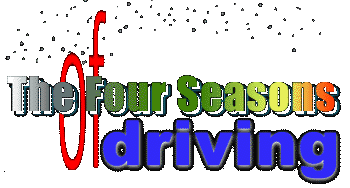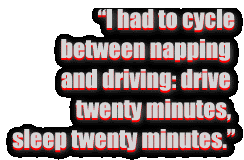|
four seasons
spring
summer
fall
rhumba.com |
To do anything in this world worth doing, we must not stand back
shivering and thinking of the cold and danger, but jump in, and
scramble through as well as we can."
n 1979, I embarked upon the first marathon drive of my career: a 20 hour drive from Charlottesville Virginia to New Orleans Louisiana. As befitting my youthful innocence, I had no idea there might be anything dangerous about this trip, or in a larger sense, my new life. It wasn't as though I'd never driven anywhere. In fact, the previous two years had seen my young body fling itself down Interstate 95 for two college-kid Spring Break marathons, one to Pensacola Florida, another to the Florida Keys. Both are in the 20-hour-plus range. These were brand new experiences. The beguiling, stupifying hypnosis that comes after driving six or eight hours straight, overnight, is like a trippy novelty made all the more interesting by the tendency to want to go even faster under the spell of the dreamlike, white-stripe- down-the-middle trance. Doing 80 miles per hour in a fatigue-induced trance on a two lane Georgia highway in the middle of a silent April night seemed hardly real enough to be dangerous. Musicians do a lot of late night driving. A LOT. For most regional touring musicians the routine goes something like this: meet in the afternoon. Pile into the van, truck or cars, drive 2 to 5 hours to the gig, set up, do a sound check, eat dinner and play until 1 or 2 in the morning. What happens next depends on the band's schedule. If the gig is a one-nighter, the next step is almost always to drive home, no matter how long it takes. Your basic 16 to 20 hour work day, arriving home between 6am and 10am. You feel like the living dead, but you're HOME, and that's way better than waking up ... somewhere else. If you are on the road the routine varies. If the next gig isn't too far (4 to 6 hours) you might crash in a cheap motel, get up the next day and do it all over again. If the next gig is farther away (8 to 12 hours) it may necessitate an all night drive. Whatever the circumstances, musicians spend thousands of these all-nighters, driving (or being driven by others) beyond exhaustion, fighting to beat road-hypnotism. It is indeed a serious occupational hazard: the National Sleep Foundation cites studies which estimate 50 percent of fatal crashes are caused by drowsy drivers. Everyone has methods for staying awake. They are typical (coffee,
No-Doz, chocolate, loud music, cold air), Driving straight to New Orleans on my first road trip was different than my spring break Florida drives, but not because I was any wiser. My attitude had subtly shifted. I'd already acquired a distant notion that this wasn't a pure joy ride—we were WORKING and I felt a responsibility to drive long stretches. Part of this was a macho notion that as someone who'd already done this sort of thing I was a good enough judge to know when I was too tired to continue. Some musician road warriors feed on this machismo, driving hours beyond what is safe or reasonable. Making things more dangerous was that we were taking ephedrine, a legal, over-the-counter stay-awake substance sold in truckstops. Marketed in little black capsules, a gaudy imitation of the black market speed known as black beauties, we called these ersatz fatigue-aids "beaners." In retrospect, good black market speed might have been safer. At least we would have been wired awake. With these cheap, unhealthy beaners (repeated ephedrine usage has since been shown to be very rough on one's nervous system and heart) we had only a marginal sensation of alertness, overlaid with massive self-delusional feelings that went something like "well, I took all this stuff, it MUST be keeping me awake!" But not so, on the warm afternoon of the second day, cruising across flat Mississippi swamps, a stone's throw from New Orleans. I had not driven Judy's (our singer's) blue Buick station wagon all night, but was exhausted just the same. I remember feeling all right, driving across the numbingly uniform swamp, reasonably alert, just cruising. Then, jolted as if an alarm clock had gone off next to my head. It was Judy, grabbing me, yelling "Brian! Brian! What's Up? Are you OK?!" Asleep, I was abandoning the road, opting for a gentle drift from the boundries of the two lanes, the Buick flowing evenly down the paved right of way of the wide, swamp-flanked highway. It couldn't have lasted more than a few seconds. We were lucky the flat, wide landscape was so forgiving. I stopped the car (I had already pulled over!), heart beating fast, adrenaline soaring. There I was, a 21 year-old on his first professional road trip, shaken, having just experienced unscathed the winterous dangers of the road, on a warm Mississippi afternoon.
NEXT ... |
|

 more
exotic (jalepeno peppers, stimulants legal and illegal) and very
personal and weird (singing, shouting, slapping one's own face). Once,
while driving by myself from Providence, Rhode Island to Washington,
D.C. (a distance of 421 miles), I was so beat, for the last 120 miles
I had to cycle between napping and driving: drive twenty minutes,
sleep twenty minutes. In all these situations you do whatever works,
because there's only one rule:
more
exotic (jalepeno peppers, stimulants legal and illegal) and very
personal and weird (singing, shouting, slapping one's own face). Once,
while driving by myself from Providence, Rhode Island to Washington,
D.C. (a distance of 421 miles), I was so beat, for the last 120 miles
I had to cycle between napping and driving: drive twenty minutes,
sleep twenty minutes. In all these situations you do whatever works,
because there's only one rule: